北师大版高中英语模块1 Unit 3 Celebration 情态动词(Ⅱ)
文档属性
| 名称 | 北师大版高中英语模块1 Unit 3 Celebration 情态动词(Ⅱ) |
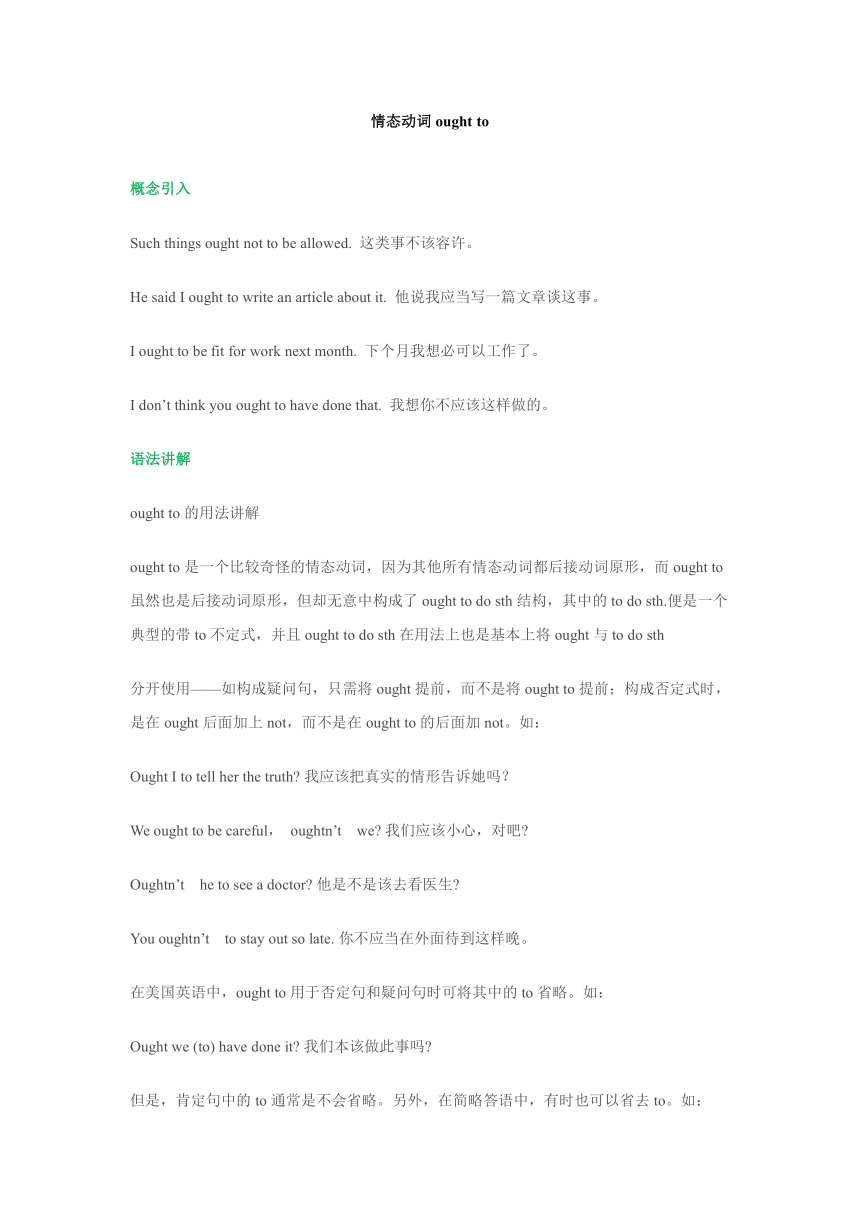
|
|
| 格式 | zip | ||
| 文件大小 | 32.2KB | ||
| 资源类型 | 教案 | ||
| 版本资源 | 北师大版 | ||
| 科目 | 英语 | ||
| 更新时间 | 2019-11-07 14:24:54 | ||
图片预览

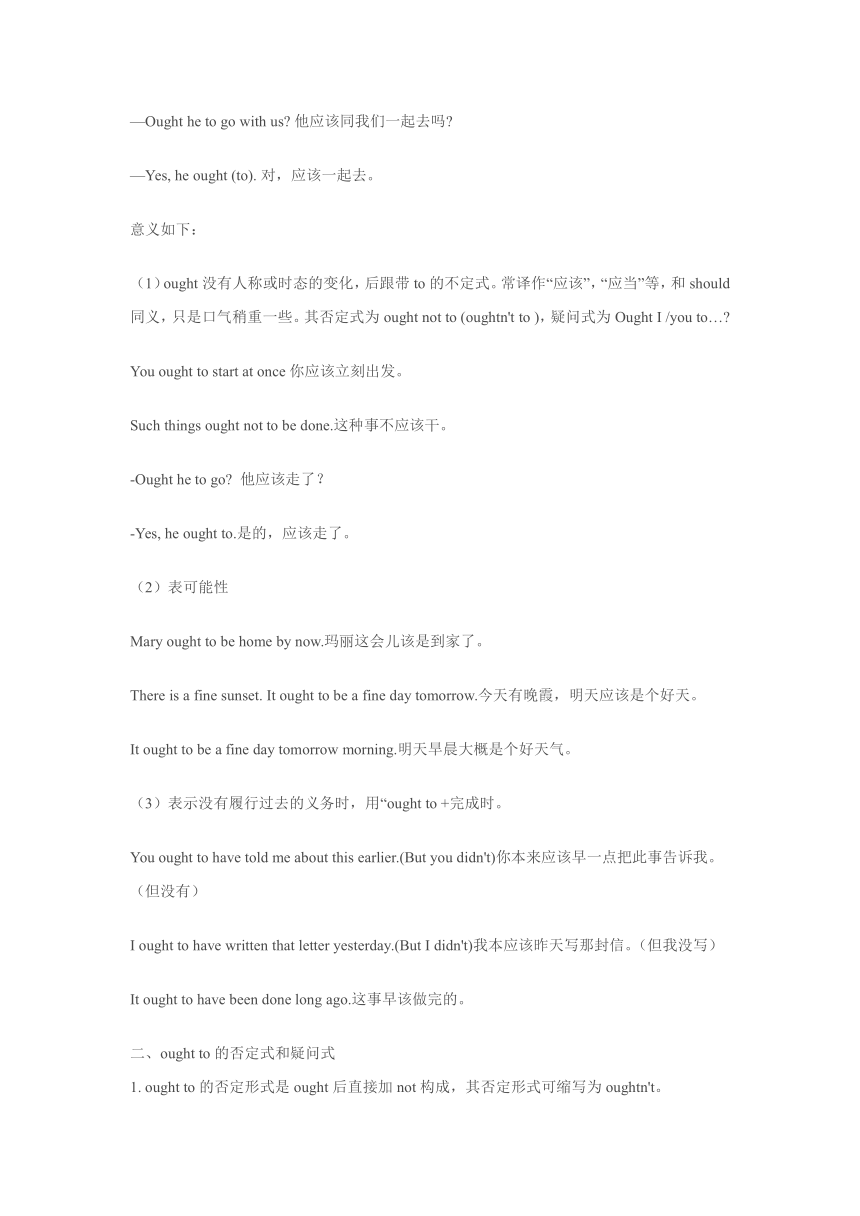
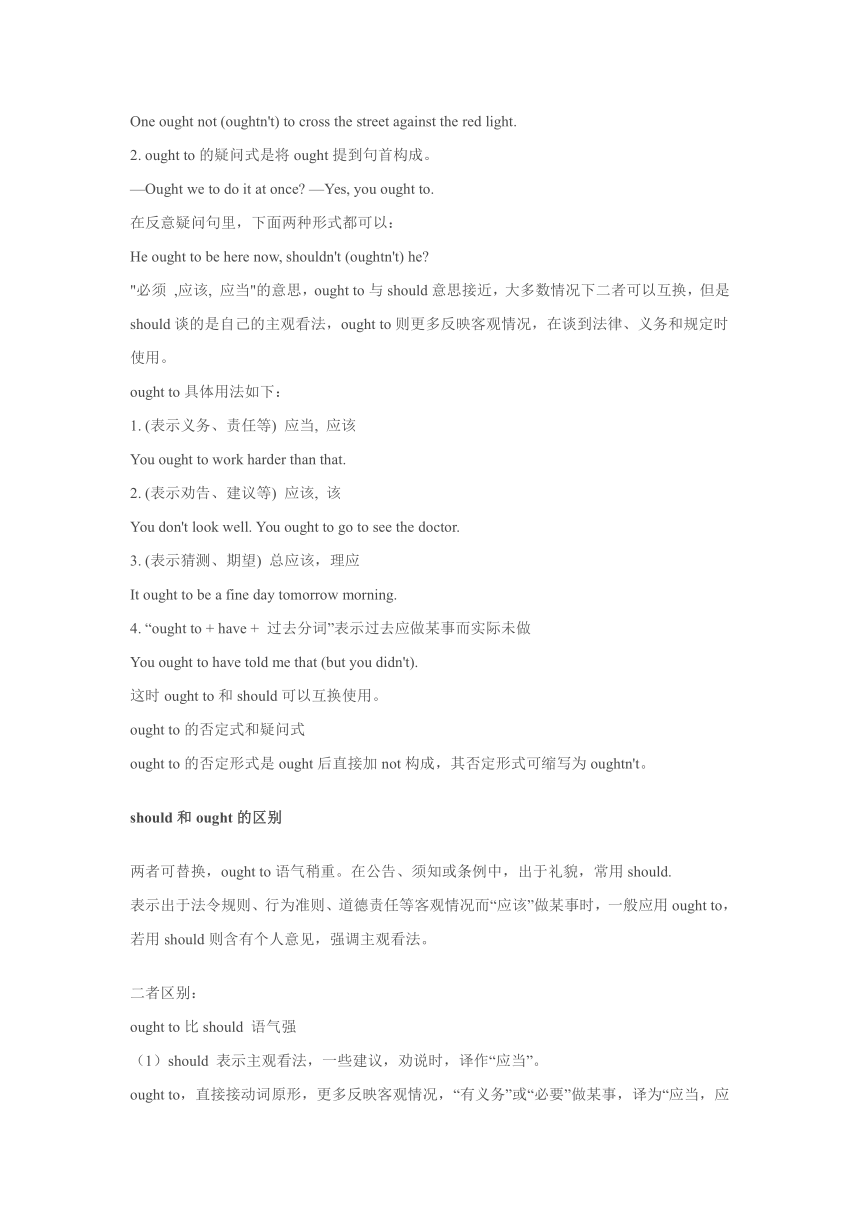
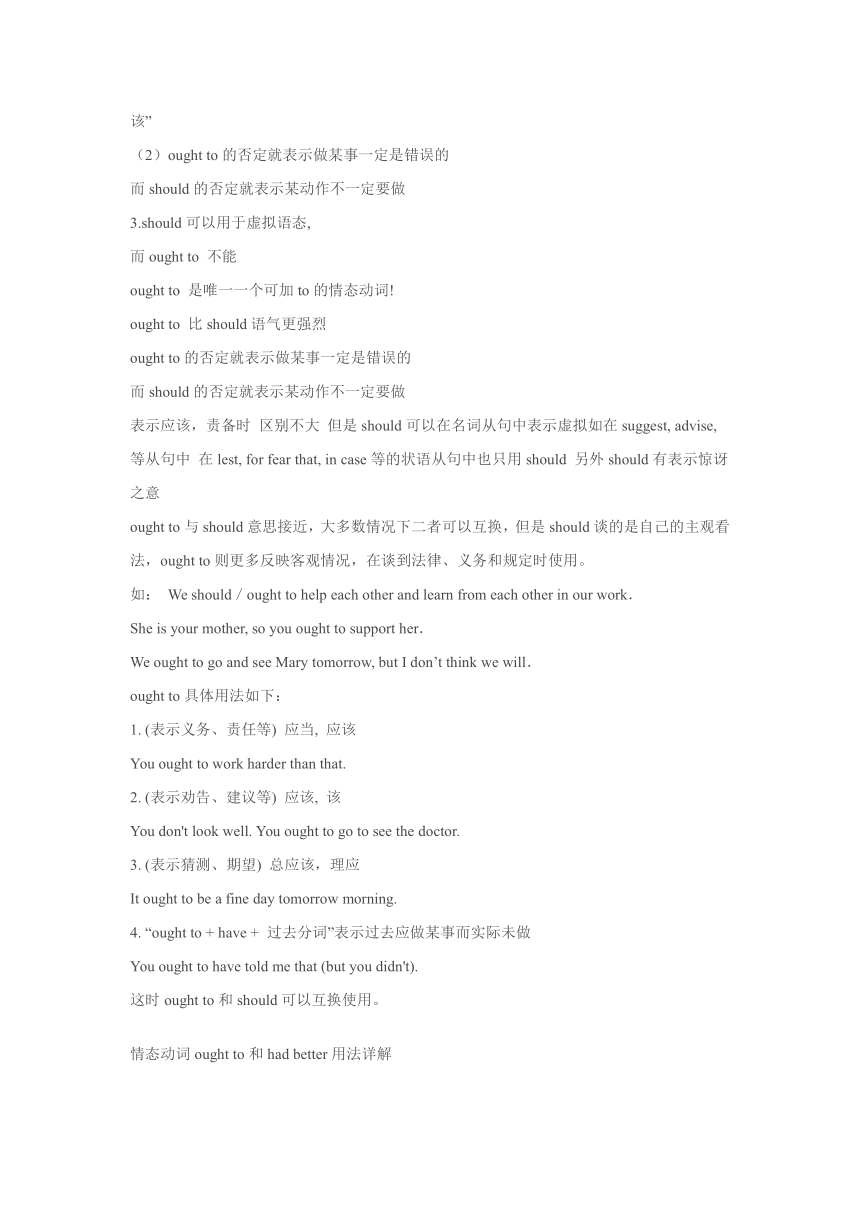
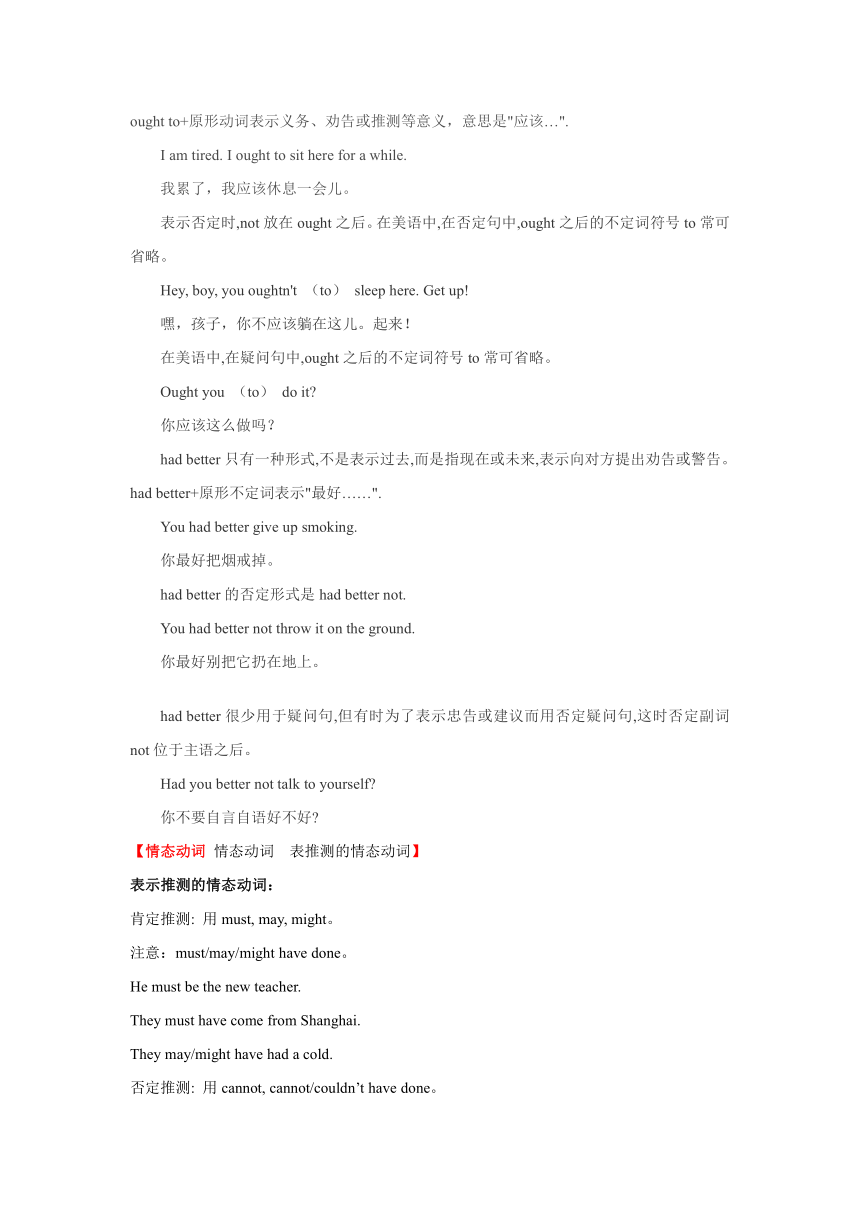
文档简介
情态动词ought to
概念引入
Such things ought not to be allowed. 这类事不该容许。
He said I ought to write an article about it. 他说我应当写一篇文章谈这事。
I ought to be fit for work next month. 下个月我想必可以工作了。
I don’t think you ought to have done that. 我想你不应该这样做的。
语法讲解
ought to的用法讲解
ought to是一个比较奇怪的情态动词,因为其他所有情态动词都后接动词原形,而ought to虽然也是后接动词原形,但却无意中构成了ought to do sth结构,其中的to do sth.便是一个典型的带to不定式,并且ought to do sth在用法上也是基本上将ought与to do sth
分开使用——如构成疑问句,只需将ought提前,而不是将ought to提前;构成否定式时,是在ought后面加上not,而不是在ought to的后面加not。如:
Ought I to tell her the truth??我应该把真实的情形告诉她吗?
We ought to be careful, oughtn’t we??我们应该小心,对吧?
Oughtn’t he to see a doctor??他是不是该去看医生?
You oughtn’t to stay out so late.?你不应当在外面待到这样晚。
在美国英语中,ought to用于否定句和疑问句时可将其中的to省略。如:
Ought we (to) have done it??我们本该做此事吗?
但是,肯定句中的to通常是不会省略。另外,在简略答语中,有时也可以省去to。如:
—Ought he to go with us??他应该同我们一起去吗?
—Yes, he ought (to).?对,应该一起去。
意义如下:
(1)ought没有人称或时态的变化,后跟带to的不定式。常译作“应该”,“应当”等,和should同义,只是口气稍重一些。其否定式为ought not to (oughtn't to ),疑问式为Ought I /you to…?
You ought to start at once你应该立刻出发。
Such things ought not to be done.这种事不应该干。
-Ought he to go? 他应该走了?
-Yes, he ought to.是的,应该走了。
(2)表可能性
Mary ought to be home by now.玛丽这会儿该是到家了。
There is a fine sunset. It ought to be a fine day tomorrow.今天有晚霞,明天应该是个好天。
It ought to be a fine day tomorrow morning.明天旱晨大概是个好天气。
(3)表示没有履行过去的义务时,用“ought to +完成时。
You ought to have told me about this earlier.(But you didn't)你本来应该早一点把此事告诉我。(但没有)
I ought to have written that letter yesterday.(But I didn't)我本应该昨天写那封信。(但我没写)
It ought to have been done long ago.这事早该做完的。
二、ought to的否定式和疑问式? 1. ought to的否定形式是ought后直接加not构成,其否定形式可缩写为oughtn't。? One ought not (oughtn't) to cross the street against the red light.? 2. ought to的疑问式是将ought提到句首构成。? —Ought we to do it at once? —Yes, you ought to.? 在反意疑问句里,下面两种形式都可以:? He ought to be here now, shouldn't (oughtn't) he?? "必须 ,应该, 应当"的意思,ought to与should意思接近,大多数情况下二者可以互换,但是should谈的是自己的主观看法,ought to则更多反映客观情况,在谈到法律、义务和规定时使用。? ought to具体用法如下:? 1. (表示义务、责任等) 应当, 应该? You ought to work harder than that.? 2. (表示劝告、建议等) 应该, 该? You don't look well. You ought to go to see the doctor.? 3. (表示猜测、期望) 总应该,理应? It ought to be a fine day tomorrow morning.? 4. “ought to + have + 过去分词”表示过去应做某事而实际未做? You ought to have told me that (but you didn't).? 这时ought to和should可以互换使用。? ought to的否定式和疑问式? ought to的否定形式是ought后直接加not构成,其否定形式可缩写为oughtn't。?
should和ought的区别
两者可替换,ought to语气稍重。在公告、须知或条例中,出于礼貌,常用should.? 表示出于法令规则、行为准则、道德责任等客观情况而“应该”做某事时,一般应用ought to,若用should则含有个人意见,强调主观看法。
二者区别:? ought to比should 语气强? (1)should 表示主观看法,一些建议,劝说时,译作“应当”。? ought to,直接接动词原形,更多反映客观情况,“有义务”或“必要”做某事,译为“应当,应该”? (2)ought to的否定就表示做某事一定是错误的? 而should的否定就表示某动作不一定要做? 3.should可以用于虚拟语态,? 而ought to 不能? ought to 是唯一一个可加to的情态动词!? ought to 比should语气更强烈? ought to的否定就表示做某事一定是错误的? 而should的否定就表示某动作不一定要做? 表示应该,责备时 区别不大 但是should可以在名词从句中表示虚拟如在suggest, advise,等从句中 在lest, for fear that, in case等的状语从句中也只用should 另外should有表示惊讶之意? ought to与should意思接近,大多数情况下二者可以互换,但是should谈的是自己的主观看法,ought to则更多反映客观情况,在谈到法律、义务和规定时使用。? 如: We should/ought to help each other and learn from each other in our work.? She is your mother, so you ought to support her.? We ought to go and see Mary tomorrow, but I don’t think we will.? ought to具体用法如下:? 1. (表示义务、责任等) 应当, 应该? You ought to work harder than that.? 2. (表示劝告、建议等) 应该, 该? You don't look well. You ought to go to see the doctor.? 3. (表示猜测、期望) 总应该,理应? It ought to be a fine day tomorrow morning.? 4. “ought to + have + 过去分词”表示过去应做某事而实际未做? You ought to have told me that (but you didn't).? 这时ought to和should可以互换使用。?
情态动词ought to和had better用法详解
ought to+原形动词表示义务、劝告或推测等意义,意思是"应该…".? I am tired. I ought to sit here for a while.? 我累了,我应该休息一会儿。? 表示否定时,not放在ought之后。在美语中,在否定句中,ought之后的不定词符号to常可 省略。? Hey, boy, you oughtn't (to) sleep here. Get up!? 嘿,孩子,你不应该躺在这儿。起来!? 在美语中,在疑问句中,ought之后的不定词符号to常可省略。? Ought you (to) do it?? 你应该这么做吗?? had better只有一种形式,不是表示过去,而是指现在或未来,表示向对方提出劝告或警告。 had better+原形不定词表示"最好……".? You had better give up smoking.? 你最好把烟戒掉。? had better的否定形式是had better not.? You had better not throw it on the ground.? 你最好别把它扔在地上。?
had better很少用于疑问句,但有时为了表示忠告或建议而用否定疑问句,这时否定副词 not位于主语之后。? Had you better not talk to yourself?? 你不要自言自语好不好?
【情态动词 情态动词 表推测的情态动词】
表示推测的情态动词:
肯定推测: 用must, may, might。
注意:must/may/might have done。
He must be the new teacher.
They must have come from Shanghai.
They may/might have had a cold.
否定推测: 用cannot, cannot/couldn’t have done。
She cannot be his daughter. She is too old.
They cannot/couldn’t have caught the 9:15 train, for they left the hotel at 9:20.
He can’t have heard us. Knock again.
need
情态动词: 常常用于否定和疑问句。
You don’t need to tell Susan. She knows it.
— Need I tell you where you are?
— No, you needn’t.
实意动词:
She needs help. She needs to have an ID card.
You don’t need to go there to have your exam.
need doing
dare
He dares to do anything, but this time he dare not do.
I dare not ask him questions.
Dare he tell them what happened yesterday?
He doesn’t dare to go there by himself.
He will never dare to come again.
ought to=should
We ought to love others as ourselves.
You oughtn’t to smoke that much.
They ought not to have gone there yesterday.
巩固练习
选择适当的情态动词
According to the school rule, you ______ walk through the school gate without permission. (mustn’t/ needn’t)
There was a lot of fun at yesterday’s party. You ______ come. Why don’t you? (should/ought to have)
Mother is out. I will ______ stay at home to look after my younger sister. (have to /must)
He is from an English speaking country, so he ______ speak English well. ( can /may)
Finally they ______ escape from the burning building. (were able to / could)
The skyscraper was built on what ______ be a wasteland. (would/ used to)
I can’t believe that! How ______ he be so rude like this! (would/should)
完成下面A、B两项练习
A. ought to 1. He ought to help his brother work out the problem. (改成否定句) ? ___________________________________________________________ 2.Tom ought to go to have a rest. (改成一般疑问句) ______________________________________________________________ 3.Such things ought to be done at once, _____________?(反意问句) B. 用must, have to, can, ought to, used to和be able to 的适当形式填空。 1. In some parts of the world, you ______boil the water before drinking it. 2. The bus caught fire seriously, but the passengers ????______escape from it. 3. He ______have stayed at home this morning. I saw him shopping in another city. 4. You ______ smoke in this part of the hospital. 5. You ______keep a simple first aid box at home for any accidents. 6. If she is completely well, she ______be back at school today. 7. My father ______be a heavy smoker, but now he has given up the habit. 8. ------You ______have finished the article. The deadline is last Friday. ? ------Sorry. I have been busy these days. Could you give me 3 days more? 9. She ______ breathe, so I used the mouth-to-mouth way.
10. He ______have caught a bad cold last night, for his forehead felt burning.
单项选择
1. —How’s your tour around the North Lake? Is it beautiful?
—It ________ be, but it is now heavily polluted.
A. will B. would C. should D. must
2. —Guess what! I have got A for my term paper.
—Great! You ______ read widely and put a lot of work into it.
A. must B. should C. must have D. should have
3. The teacher _______have thought Johnson was worth it or she wouldn't have wasted time on him, I suppose.
A. should B. can C. would D. must
4. In crowded places like airports and railway stations, you___ take care of your luggage.
A. can B. may C. must D. will
5. My MP4 player isn’t in my bag. Where I have put it?
A. can B .must C .should D .would
6. The biggest problem for most plants, which ________ just get up and run away when threatened, is that animals like to eat them.
A. shan’t B. can’t C. needn’t D. mustn’t
7. —She looks very happy. She ______ have passed the exam.
—I guess so. It’s not difficult after all.
A. should B. could C. must D. might
8. —Where is my dictionary? I remember I put it here yesterday.
—You it in the wrong place.
A. must put B. should have put C .might put D. might have put
9. As a result of the serious flood, two-thirds of the buildings in the area .
A .need repairing B. needs to repair C. needs repairing D. need to repair
10. I told your friend how to get to the hotel, but perhaps I have driven her there.
A. could B .must C .night D. should
11. The boss has given everyone a special holiday, so we go to work tomorrow.
A.can’t B.mustn’t C.needn’t D.shouldn’t
12. —What does the sign over there read?
—“No person ___ smoke or carry a lighted cigarette,cigar or pipe in this area.”
A.will B.may C.shall D. must
13. —My cat’s really fat.
—You ______ have given her so much food.
A. wouldn’t B. couldn’t C. shouldn’t D. mustn’t
14. —What do you think we can do for our aged parents?
—You ________ do anything except to be with them and be yourself.
A. don’t have to B. oughtn’t to C. mustn’t D. can’t
15. —Turn off the TV, Jack. ____ your homework now?
—Mum, just ten more minutes, please.
A .Should you be doing B. Shouldn't you be doing
C. Couldn't you be doing D. Will you be doing
16. When I was young, I was told that I ______ play with matches.
A. wouldn’t B. needn’t C. mustn’t D. daren’t
17. According to the air traffic rules, you __ switch off your mobile phone before boarding.
A. may B. can C. would D. should
18. — You ought to have called her yesterday . ??— Yes , I know I ____ .
A.ought to
B.ought to have
C.ought have done
D.ought to have called
19. Why did you keep it a secret from me ? I ____ about it .
A.should be told
B.ought to have been told
C.should have told
D.ought to be told
20. If he had started at nine o’clock, he???????have been in London by eleven o’clock.
A.must
B.may
C.ought to
D.has to
答案解析
选择适当的情态动词
1.mustn’t 2.ought to have 3.have to 4.can 5.were able to 6.used to 7.should
完成下面A、B两项练习
A. 1. He ought not (oughtn’t)to help his brother work out the problem. ??? 2. Ought Tom to go to have a rest? ?? 3. ought they? B. 1. must/have to???? 2. were able to??? 3. can’t/couldn’t?? 4. mustn’t ?? 5. ought to??????? 6. ought to?????? 7. used to???????? 8. ought to 9. wasn’t able to?? 10. must 单项选择
1. 答案:C 解析:该题考查的知识点是should的用法。根据对话的意思可以判断,the North Lake应该是很美的一个湖泊,但现在被污染了,言外之意,这个湖泊之美要打上问号。Should这个情态动词有“按理推测”的含义,可译成“理应……”等含义,符合对话的真实意图。will表“现在的自然倾向”,would表“过去习惯、倾向”,must 表“肯定推测”,均不符句意。
2. 答案:C 解析:must have done表示“过去肯定做了某事”。should have done表示“本该做某事而没做”。根据上文情景I have got A for my term paper可判断出一定进行了广泛阅读并做了大量工作。所以答案为C项。
3. 答案:D 解析:根据下面“否则她是不会在他身上浪费这么多的时间的”可以知道前面的意思是:老师一定是认为在Johnson身上花时间是值得的。must have done表示对过去情况的肯定猜测。
4. 答案:C 解析:句意为:在像飞机场和车站这样拥挤的地方,你一定要照看好自己的行李。must表示“必须,一定”,符合句意。
5. 答案:A 解析:由句意 “我的MP4不在我包里。我可能把它放哪儿了?”可知应选A。can have done表示“过去可能做过”,而must have done 表示“过去肯定做过”,只能用于肯定陈述句;should have done本应该做(而事实上没做);would have done只能用于虚拟语气。
6. 答案:B 解析:can在此表示能力,can’t表示“不能”。此题所考查的知识点比较简单,但由于句子结构比较复杂,所以许多学生不是由于没有弄清知识点而误选,而是由于不理解句意而误选。全句意为:对于大多数植物来说,它们所面临的最大问题是(有些)动物喜欢以它们为食物,而当它们受到威胁时却不能起身逃跑。
7. 答案:C 解析:must have passed the exam表示“肯定是通过考试了”,由前句中的“happy”和下句中的“not difficult after all” 可以推知。
8. 答案:D 解析:本题考查情态动词表推测的用法。句意“我的词典哪儿去了?我记得昨天放在这儿了。”“你也许放错地方了”。由句意可以看出是对过去情况的推测,应该用“情态动词 + have done”的形式,故排除A、C两项;should have done sth.意为“过去本该做某事(而没做)”,故排除B项。答案为D项,might have done表示“可能做过某事”。
9. 答案:A 解析:句意为:由于猛烈的洪水侵袭,这个地区三分之二的建筑均需要修理。此题作主语的名词为复数形式,谓语动词用复数,need后边应用动名词的主动形式或不定式的被动形式。
10. 答案: D 解析:本题考查情态动词。could have done(过去)可能做过;本能够做……;must have done(过去)肯定做过;might have done(过去)可能做过;should have done本应该做(而事实上没做)。由句意“我告诉你朋友该怎么去旅馆,但或许我应该开车送她去那儿。”可知应选D项。
11. 答案:C 解析:考查情态动词的否定形式的特定含义。can’t的意思是“不可能”, shouldn’t表示“不应该”,mustn’t 与needn’t的意思大不相同,前者表示“禁止”,意思是:一定不能;后者表示“没有必要”,意思是“不必”,相当于don’t?have?to,从前句“老板放了我们假”,所以“明天没有必要上班”,故选C。
12. 答案:C 解析:shall用于第二、三人称,表示命令、允许、警告等,此处表示警告。will表示现在的意志、愿望等,意为“要,希望”;may表示许可,或用于请求许可,意为“可,可以”;must意为“必须,要,应当”。
13. 答案:C 解析:根据My cat’s really fat.可以知道是说“本不应该给猫太多食物却给了”所以答案为C。should / oughtn't to have done,意为本来不应做但实际已做,表达遗憾的感彩。
14. 答案:A 解析:句意:—你认为我们可以为我们年迈的父母做些什么事?—除了能真心地陪伴他们,你不必做任何事情。don't have to=needn't“不必”;oughtn't to“不应该”;mustn't“不可以”;can't“不能”。所以答案为A项。
15. 答案:B 解析:本题结合交际用语考查should表语气的用法。should可表示惊奇、怀疑、不满等情绪。本题句意:—Jack,关掉电视。你现在不该写作业吗?—妈妈,就看十分钟。情态动词与进行时连用常有表达感彩的功能。故B项正确。
16.答案:C解析:句子的意思是:当我年轻的时候,(家人)就一直告诫我千万不要玩火柴。must的否定形式mustn’t 表示禁止,意思是“不能,不许”。
17. 答案:D 解析:本题考查情态动词的用法。句意“根据空中交通规则,登机前应该关闭手机”,情态动词should在此表示告诉某人应该做什么,故选D。
18. 答案: B????解析:简单对话中,只重复助动、系动词和情态动词,如既有情态动词,又有助动词或系动词,则两者都重复,不重复行为动词。
19.答案: B???解析: 表示应该做某事,但事实上没做到,应用“should / ought to +不定式的完成式”,本句为被动语态。
20.答案: C 解析: 如果他那时9点开始,就该在11点到伦敦。
概念引入
Such things ought not to be allowed. 这类事不该容许。
He said I ought to write an article about it. 他说我应当写一篇文章谈这事。
I ought to be fit for work next month. 下个月我想必可以工作了。
I don’t think you ought to have done that. 我想你不应该这样做的。
语法讲解
ought to的用法讲解
ought to是一个比较奇怪的情态动词,因为其他所有情态动词都后接动词原形,而ought to虽然也是后接动词原形,但却无意中构成了ought to do sth结构,其中的to do sth.便是一个典型的带to不定式,并且ought to do sth在用法上也是基本上将ought与to do sth
分开使用——如构成疑问句,只需将ought提前,而不是将ought to提前;构成否定式时,是在ought后面加上not,而不是在ought to的后面加not。如:
Ought I to tell her the truth??我应该把真实的情形告诉她吗?
We ought to be careful, oughtn’t we??我们应该小心,对吧?
Oughtn’t he to see a doctor??他是不是该去看医生?
You oughtn’t to stay out so late.?你不应当在外面待到这样晚。
在美国英语中,ought to用于否定句和疑问句时可将其中的to省略。如:
Ought we (to) have done it??我们本该做此事吗?
但是,肯定句中的to通常是不会省略。另外,在简略答语中,有时也可以省去to。如:
—Ought he to go with us??他应该同我们一起去吗?
—Yes, he ought (to).?对,应该一起去。
意义如下:
(1)ought没有人称或时态的变化,后跟带to的不定式。常译作“应该”,“应当”等,和should同义,只是口气稍重一些。其否定式为ought not to (oughtn't to ),疑问式为Ought I /you to…?
You ought to start at once你应该立刻出发。
Such things ought not to be done.这种事不应该干。
-Ought he to go? 他应该走了?
-Yes, he ought to.是的,应该走了。
(2)表可能性
Mary ought to be home by now.玛丽这会儿该是到家了。
There is a fine sunset. It ought to be a fine day tomorrow.今天有晚霞,明天应该是个好天。
It ought to be a fine day tomorrow morning.明天旱晨大概是个好天气。
(3)表示没有履行过去的义务时,用“ought to +完成时。
You ought to have told me about this earlier.(But you didn't)你本来应该早一点把此事告诉我。(但没有)
I ought to have written that letter yesterday.(But I didn't)我本应该昨天写那封信。(但我没写)
It ought to have been done long ago.这事早该做完的。
二、ought to的否定式和疑问式? 1. ought to的否定形式是ought后直接加not构成,其否定形式可缩写为oughtn't。? One ought not (oughtn't) to cross the street against the red light.? 2. ought to的疑问式是将ought提到句首构成。? —Ought we to do it at once? —Yes, you ought to.? 在反意疑问句里,下面两种形式都可以:? He ought to be here now, shouldn't (oughtn't) he?? "必须 ,应该, 应当"的意思,ought to与should意思接近,大多数情况下二者可以互换,但是should谈的是自己的主观看法,ought to则更多反映客观情况,在谈到法律、义务和规定时使用。? ought to具体用法如下:? 1. (表示义务、责任等) 应当, 应该? You ought to work harder than that.? 2. (表示劝告、建议等) 应该, 该? You don't look well. You ought to go to see the doctor.? 3. (表示猜测、期望) 总应该,理应? It ought to be a fine day tomorrow morning.? 4. “ought to + have + 过去分词”表示过去应做某事而实际未做? You ought to have told me that (but you didn't).? 这时ought to和should可以互换使用。? ought to的否定式和疑问式? ought to的否定形式是ought后直接加not构成,其否定形式可缩写为oughtn't。?
should和ought的区别
两者可替换,ought to语气稍重。在公告、须知或条例中,出于礼貌,常用should.? 表示出于法令规则、行为准则、道德责任等客观情况而“应该”做某事时,一般应用ought to,若用should则含有个人意见,强调主观看法。
二者区别:? ought to比should 语气强? (1)should 表示主观看法,一些建议,劝说时,译作“应当”。? ought to,直接接动词原形,更多反映客观情况,“有义务”或“必要”做某事,译为“应当,应该”? (2)ought to的否定就表示做某事一定是错误的? 而should的否定就表示某动作不一定要做? 3.should可以用于虚拟语态,? 而ought to 不能? ought to 是唯一一个可加to的情态动词!? ought to 比should语气更强烈? ought to的否定就表示做某事一定是错误的? 而should的否定就表示某动作不一定要做? 表示应该,责备时 区别不大 但是should可以在名词从句中表示虚拟如在suggest, advise,等从句中 在lest, for fear that, in case等的状语从句中也只用should 另外should有表示惊讶之意? ought to与should意思接近,大多数情况下二者可以互换,但是should谈的是自己的主观看法,ought to则更多反映客观情况,在谈到法律、义务和规定时使用。? 如: We should/ought to help each other and learn from each other in our work.? She is your mother, so you ought to support her.? We ought to go and see Mary tomorrow, but I don’t think we will.? ought to具体用法如下:? 1. (表示义务、责任等) 应当, 应该? You ought to work harder than that.? 2. (表示劝告、建议等) 应该, 该? You don't look well. You ought to go to see the doctor.? 3. (表示猜测、期望) 总应该,理应? It ought to be a fine day tomorrow morning.? 4. “ought to + have + 过去分词”表示过去应做某事而实际未做? You ought to have told me that (but you didn't).? 这时ought to和should可以互换使用。?
情态动词ought to和had better用法详解
ought to+原形动词表示义务、劝告或推测等意义,意思是"应该…".? I am tired. I ought to sit here for a while.? 我累了,我应该休息一会儿。? 表示否定时,not放在ought之后。在美语中,在否定句中,ought之后的不定词符号to常可 省略。? Hey, boy, you oughtn't (to) sleep here. Get up!? 嘿,孩子,你不应该躺在这儿。起来!? 在美语中,在疑问句中,ought之后的不定词符号to常可省略。? Ought you (to) do it?? 你应该这么做吗?? had better只有一种形式,不是表示过去,而是指现在或未来,表示向对方提出劝告或警告。 had better+原形不定词表示"最好……".? You had better give up smoking.? 你最好把烟戒掉。? had better的否定形式是had better not.? You had better not throw it on the ground.? 你最好别把它扔在地上。?
had better很少用于疑问句,但有时为了表示忠告或建议而用否定疑问句,这时否定副词 not位于主语之后。? Had you better not talk to yourself?? 你不要自言自语好不好?
【情态动词 情态动词 表推测的情态动词】
表示推测的情态动词:
肯定推测: 用must, may, might。
注意:must/may/might have done。
He must be the new teacher.
They must have come from Shanghai.
They may/might have had a cold.
否定推测: 用cannot, cannot/couldn’t have done。
She cannot be his daughter. She is too old.
They cannot/couldn’t have caught the 9:15 train, for they left the hotel at 9:20.
He can’t have heard us. Knock again.
need
情态动词: 常常用于否定和疑问句。
You don’t need to tell Susan. She knows it.
— Need I tell you where you are?
— No, you needn’t.
实意动词:
She needs help. She needs to have an ID card.
You don’t need to go there to have your exam.
need doing
dare
He dares to do anything, but this time he dare not do.
I dare not ask him questions.
Dare he tell them what happened yesterday?
He doesn’t dare to go there by himself.
He will never dare to come again.
ought to=should
We ought to love others as ourselves.
You oughtn’t to smoke that much.
They ought not to have gone there yesterday.
巩固练习
选择适当的情态动词
According to the school rule, you ______ walk through the school gate without permission. (mustn’t/ needn’t)
There was a lot of fun at yesterday’s party. You ______ come. Why don’t you? (should/ought to have)
Mother is out. I will ______ stay at home to look after my younger sister. (have to /must)
He is from an English speaking country, so he ______ speak English well. ( can /may)
Finally they ______ escape from the burning building. (were able to / could)
The skyscraper was built on what ______ be a wasteland. (would/ used to)
I can’t believe that! How ______ he be so rude like this! (would/should)
完成下面A、B两项练习
A. ought to 1. He ought to help his brother work out the problem. (改成否定句) ? ___________________________________________________________ 2.Tom ought to go to have a rest. (改成一般疑问句) ______________________________________________________________ 3.Such things ought to be done at once, _____________?(反意问句) B. 用must, have to, can, ought to, used to和be able to 的适当形式填空。 1. In some parts of the world, you ______boil the water before drinking it. 2. The bus caught fire seriously, but the passengers ????______escape from it. 3. He ______have stayed at home this morning. I saw him shopping in another city. 4. You ______ smoke in this part of the hospital. 5. You ______keep a simple first aid box at home for any accidents. 6. If she is completely well, she ______be back at school today. 7. My father ______be a heavy smoker, but now he has given up the habit. 8. ------You ______have finished the article. The deadline is last Friday. ? ------Sorry. I have been busy these days. Could you give me 3 days more? 9. She ______ breathe, so I used the mouth-to-mouth way.
10. He ______have caught a bad cold last night, for his forehead felt burning.
单项选择
1. —How’s your tour around the North Lake? Is it beautiful?
—It ________ be, but it is now heavily polluted.
A. will B. would C. should D. must
2. —Guess what! I have got A for my term paper.
—Great! You ______ read widely and put a lot of work into it.
A. must B. should C. must have D. should have
3. The teacher _______have thought Johnson was worth it or she wouldn't have wasted time on him, I suppose.
A. should B. can C. would D. must
4. In crowded places like airports and railway stations, you___ take care of your luggage.
A. can B. may C. must D. will
5. My MP4 player isn’t in my bag. Where I have put it?
A. can B .must C .should D .would
6. The biggest problem for most plants, which ________ just get up and run away when threatened, is that animals like to eat them.
A. shan’t B. can’t C. needn’t D. mustn’t
7. —She looks very happy. She ______ have passed the exam.
—I guess so. It’s not difficult after all.
A. should B. could C. must D. might
8. —Where is my dictionary? I remember I put it here yesterday.
—You it in the wrong place.
A. must put B. should have put C .might put D. might have put
9. As a result of the serious flood, two-thirds of the buildings in the area .
A .need repairing B. needs to repair C. needs repairing D. need to repair
10. I told your friend how to get to the hotel, but perhaps I have driven her there.
A. could B .must C .night D. should
11. The boss has given everyone a special holiday, so we go to work tomorrow.
A.can’t B.mustn’t C.needn’t D.shouldn’t
12. —What does the sign over there read?
—“No person ___ smoke or carry a lighted cigarette,cigar or pipe in this area.”
A.will B.may C.shall D. must
13. —My cat’s really fat.
—You ______ have given her so much food.
A. wouldn’t B. couldn’t C. shouldn’t D. mustn’t
14. —What do you think we can do for our aged parents?
—You ________ do anything except to be with them and be yourself.
A. don’t have to B. oughtn’t to C. mustn’t D. can’t
15. —Turn off the TV, Jack. ____ your homework now?
—Mum, just ten more minutes, please.
A .Should you be doing B. Shouldn't you be doing
C. Couldn't you be doing D. Will you be doing
16. When I was young, I was told that I ______ play with matches.
A. wouldn’t B. needn’t C. mustn’t D. daren’t
17. According to the air traffic rules, you __ switch off your mobile phone before boarding.
A. may B. can C. would D. should
18. — You ought to have called her yesterday . ??— Yes , I know I ____ .
A.ought to
B.ought to have
C.ought have done
D.ought to have called
19. Why did you keep it a secret from me ? I ____ about it .
A.should be told
B.ought to have been told
C.should have told
D.ought to be told
20. If he had started at nine o’clock, he???????have been in London by eleven o’clock.
A.must
B.may
C.ought to
D.has to
答案解析
选择适当的情态动词
1.mustn’t 2.ought to have 3.have to 4.can 5.were able to 6.used to 7.should
完成下面A、B两项练习
A. 1. He ought not (oughtn’t)to help his brother work out the problem. ??? 2. Ought Tom to go to have a rest? ?? 3. ought they? B. 1. must/have to???? 2. were able to??? 3. can’t/couldn’t?? 4. mustn’t ?? 5. ought to??????? 6. ought to?????? 7. used to???????? 8. ought to 9. wasn’t able to?? 10. must 单项选择
1. 答案:C 解析:该题考查的知识点是should的用法。根据对话的意思可以判断,the North Lake应该是很美的一个湖泊,但现在被污染了,言外之意,这个湖泊之美要打上问号。Should这个情态动词有“按理推测”的含义,可译成“理应……”等含义,符合对话的真实意图。will表“现在的自然倾向”,would表“过去习惯、倾向”,must 表“肯定推测”,均不符句意。
2. 答案:C 解析:must have done表示“过去肯定做了某事”。should have done表示“本该做某事而没做”。根据上文情景I have got A for my term paper可判断出一定进行了广泛阅读并做了大量工作。所以答案为C项。
3. 答案:D 解析:根据下面“否则她是不会在他身上浪费这么多的时间的”可以知道前面的意思是:老师一定是认为在Johnson身上花时间是值得的。must have done表示对过去情况的肯定猜测。
4. 答案:C 解析:句意为:在像飞机场和车站这样拥挤的地方,你一定要照看好自己的行李。must表示“必须,一定”,符合句意。
5. 答案:A 解析:由句意 “我的MP4不在我包里。我可能把它放哪儿了?”可知应选A。can have done表示“过去可能做过”,而must have done 表示“过去肯定做过”,只能用于肯定陈述句;should have done本应该做(而事实上没做);would have done只能用于虚拟语气。
6. 答案:B 解析:can在此表示能力,can’t表示“不能”。此题所考查的知识点比较简单,但由于句子结构比较复杂,所以许多学生不是由于没有弄清知识点而误选,而是由于不理解句意而误选。全句意为:对于大多数植物来说,它们所面临的最大问题是(有些)动物喜欢以它们为食物,而当它们受到威胁时却不能起身逃跑。
7. 答案:C 解析:must have passed the exam表示“肯定是通过考试了”,由前句中的“happy”和下句中的“not difficult after all” 可以推知。
8. 答案:D 解析:本题考查情态动词表推测的用法。句意“我的词典哪儿去了?我记得昨天放在这儿了。”“你也许放错地方了”。由句意可以看出是对过去情况的推测,应该用“情态动词 + have done”的形式,故排除A、C两项;should have done sth.意为“过去本该做某事(而没做)”,故排除B项。答案为D项,might have done表示“可能做过某事”。
9. 答案:A 解析:句意为:由于猛烈的洪水侵袭,这个地区三分之二的建筑均需要修理。此题作主语的名词为复数形式,谓语动词用复数,need后边应用动名词的主动形式或不定式的被动形式。
10. 答案: D 解析:本题考查情态动词。could have done(过去)可能做过;本能够做……;must have done(过去)肯定做过;might have done(过去)可能做过;should have done本应该做(而事实上没做)。由句意“我告诉你朋友该怎么去旅馆,但或许我应该开车送她去那儿。”可知应选D项。
11. 答案:C 解析:考查情态动词的否定形式的特定含义。can’t的意思是“不可能”, shouldn’t表示“不应该”,mustn’t 与needn’t的意思大不相同,前者表示“禁止”,意思是:一定不能;后者表示“没有必要”,意思是“不必”,相当于don’t?have?to,从前句“老板放了我们假”,所以“明天没有必要上班”,故选C。
12. 答案:C 解析:shall用于第二、三人称,表示命令、允许、警告等,此处表示警告。will表示现在的意志、愿望等,意为“要,希望”;may表示许可,或用于请求许可,意为“可,可以”;must意为“必须,要,应当”。
13. 答案:C 解析:根据My cat’s really fat.可以知道是说“本不应该给猫太多食物却给了”所以答案为C。should / oughtn't to have done,意为本来不应做但实际已做,表达遗憾的感彩。
14. 答案:A 解析:句意:—你认为我们可以为我们年迈的父母做些什么事?—除了能真心地陪伴他们,你不必做任何事情。don't have to=needn't“不必”;oughtn't to“不应该”;mustn't“不可以”;can't“不能”。所以答案为A项。
15. 答案:B 解析:本题结合交际用语考查should表语气的用法。should可表示惊奇、怀疑、不满等情绪。本题句意:—Jack,关掉电视。你现在不该写作业吗?—妈妈,就看十分钟。情态动词与进行时连用常有表达感彩的功能。故B项正确。
16.答案:C解析:句子的意思是:当我年轻的时候,(家人)就一直告诫我千万不要玩火柴。must的否定形式mustn’t 表示禁止,意思是“不能,不许”。
17. 答案:D 解析:本题考查情态动词的用法。句意“根据空中交通规则,登机前应该关闭手机”,情态动词should在此表示告诉某人应该做什么,故选D。
18. 答案: B????解析:简单对话中,只重复助动、系动词和情态动词,如既有情态动词,又有助动词或系动词,则两者都重复,不重复行为动词。
19.答案: B???解析: 表示应该做某事,但事实上没做到,应用“should / ought to +不定式的完成式”,本句为被动语态。
20.答案: C 解析: 如果他那时9点开始,就该在11点到伦敦。
